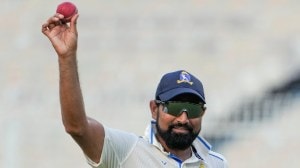Indian envoy justifies demand to blacklist Pak
WASHINGTON, JANUARY 6: Indian Ambassador to the US Naresh Chandra has said that Washington has not actually rejected India's call to decla...

WASHINGTON, JANUARY 6: Indian Ambassador to the US Naresh Chandra has said that Washington has not actually rejected India8217;s call to declare Pakistan a terrorist state and asserted that circumstantial evidence already on public record is enough to justify New Delhi8217;s plea.
8220;What the US has said is that the matter is under review,quot; Chandra said addressing a seminar organised by the Potomac institute of policy studies here.
Chandra gave a blow by blow account of the recent hijacking to show that the hijackers could have come only from Pakistan. He cited several past instances of hijackings to bolster his argument.
He said reports that one of the three released militants was accorded a warm welcome in Pak-occupied Kashmir PoK clearly suggest Pakistan8217;s complicity in the incident.
The militants could not have been able to enter PoK from Kandahar without crossing Pakistan, he said.
As far as India is concerned, he said, 8220;we have no doubt that according to provisions of the US law, such a determination is eminently justifiable and necessary.quot;
He dismissed suggestion from a Pakistani diplomat present in the audience that India could have stagemanaged to quot;misrepresent the Kashmiri freedom struggle.quot;
quot;No reasonable person would give a moment8217;s consideration to the idea8230; Such kind and planning is not possible in an open society and democracy like India,quot; Chandra said.
Chandra said the hijacking was apparently financed by a Kathmandu-based Pakistan embassy employee who distributed thousands of counterfeit Indian currency. The employee, Wasim Saboor, has since been declared persona non grata and asked to leave Nepal.
Also unfolding, with the welcome given to a released militants in Muzaffarabad, is the argument that Pakistan is preparing 8212; that it cannot arrest any of the hijackers because they are technically not in Pakistan but in quot;azad Kashmir,quot; he said.
Referring to a British foreign office statement that a militant, Umar Sayeed Sheikh, a Pak-born British national would be allowed entry into Britain, Chandra said technically a British passport holder could return to that country.
But what happens next is another matter, he said, reminding the audience that India has an extradition treaty with Britain.
Terming the role played by Taliban in the hijacking as quot;a bit complexquot;, he, however, said the militia quot;set a certain line and whatever their policies be they stuck to them.quot;
quot;At a basic level, people in India feel good about the reaction of the Taliban authorities when they told the hijackers,8217; if you shed innocent blood, we will tackle you.quot;
quot;The second aspect reflects the other side. Their desire to get rid of it and saying, you have to take the plane off.8217; Put pressure on Indian negotiators to come to a resolutionquot; in order to save the lives of over 150 people,quot; Chandra said.
Referring to a Washington report, which was later retracted with an apology, that the hijackers were Sikhs, Chandra said, it was deliberately planted to throw India off the scent.
- 01
- 02
- 03
- 04
- 05






























